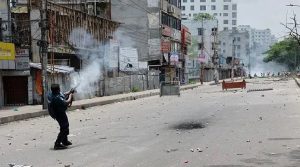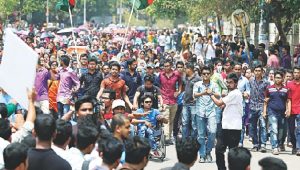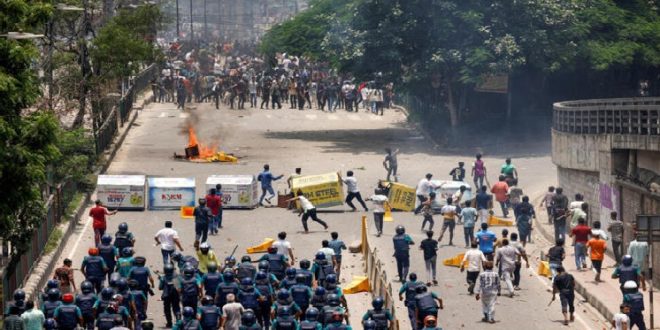22-07-2024
DHAKA: Bangladesh Supreme Court scales back controversial government job quota system, which triggered deadly nationwide unrest last week.
Student leaders vow to press on with demonstrations until key demands are met, including the release of those jailed, and officials responsible for deadly violence resign.
 It says 93 percent of jobs should be on merit allowing only 5 percent reservation for relatives of freedom fighters and 2 percent for members of ethnic minorities and transgender and disabled people. Students have been demanding abolition of 30 percent quota for the 1971 liberation war veterans.
It says 93 percent of jobs should be on merit allowing only 5 percent reservation for relatives of freedom fighters and 2 percent for members of ethnic minorities and transgender and disabled people. Students have been demanding abolition of 30 percent quota for the 1971 liberation war veterans.
Protests began after High Court reinstated controversial quota system last month, which turned violent last week after governing party workers attacked protesting students. A witness says army teams were deployed throughout the capital Dhaka and that streets near the Supreme Court were quiet immediately after the decision.
A military tank was stationed outside the Supreme Court gate, television footage showed.
Local media had reported scattered clashes earlier in the day between protesters and security forces.
Soldiers were on patrol on the streets of capital Dhaka, the centre of the demonstrations that spiraled into clashes.
Internet and text message services in Bangladesh have been suspended since Thursday, cutting the nation off as police cracked down on protesters who defied a ban on public gatherings.
It was not immediately clear how the protesters would react to the decision. Ahead of the Supreme Court hearing, soldiers patrolled cities across the South Asian country with a population of 170 million.
Home Minister Asaduzzaman Khan said a stay-at-home order will be relaxed from 3pm (09:00 GMT) to 5pm (11:00 GMT) for people to run essential errands. The government declared Sunday and Monday as public holidays with only emergency services allowed to operate.
 The main opposition Bangladesh Nationalist Party (BNP) has backed the protests, vowing to organize its own demonstrations as many of its supporters have joined the students. However, BNP said in a statement its followers were not responsible for the violence and denied the ruling party’s accusations of using the protests for political gain. The demonstrations are notable not only for their size and intensity, but also their demographics.
The main opposition Bangladesh Nationalist Party (BNP) has backed the protests, vowing to organize its own demonstrations as many of its supporters have joined the students. However, BNP said in a statement its followers were not responsible for the violence and denied the ruling party’s accusations of using the protests for political gain. The demonstrations are notable not only for their size and intensity, but also their demographics.
“It’s not just a case of grassroots demonstrations led by the poor. These are university students, most of whom are above working class,” Michael Kugelman, director of the South Asia Institute at the Wilson Center, told media.
“The fact that you have so many students who are so angry speaks to the desperation of finding jobs. They may not be desperately poor, but they still need to find good, stable jobs.”
Vina Nadjibulla, vice president of research and strategy at the Asia Pacific Foundation of Canada, said the South Asian country faces an “acute job crisis for university graduates”.
“The 30 percent quota will hit that group,” Nadjibulla told media, referring to the jobs reserved for descendants of “freedom fighters”.
We haven’t seen any crowds in the streets. There are few people.
The student line was that the verdict was satisfactory but they said it failed to mention the detained students and those who died in recent clashes. So there is still a lot of apprehension on how people will react and many are anxiously waiting to see if something will happen. (Int’l Monitoring Desk)
 Pressmediaofindia
Pressmediaofindia




